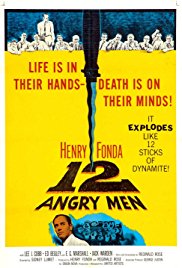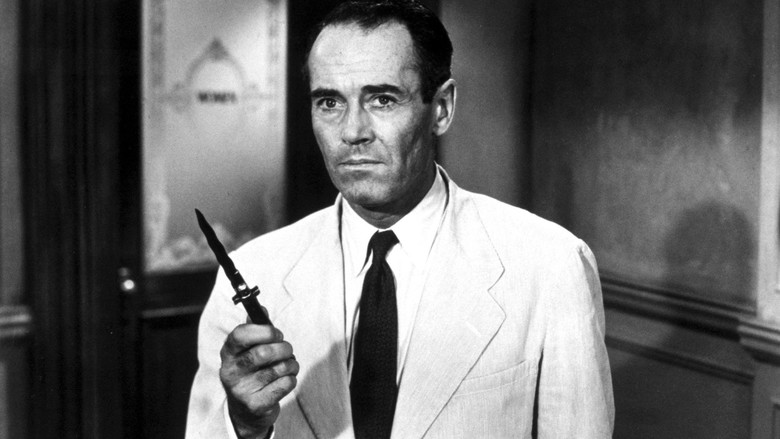After the film has been watched, engage the class in a discussion about the movie.
1. The dissenting juror may have suspected that the young man actually did kill his father. Why does he still argue that the young man should be acquitted of the charges?
Suggested Response:
The dissenting juror understands that a conviction requires proof beyond a reasonable doubt and he pursues his doubts relentlessly yet patiently and with respect for the other juror’s opinions.
2. What are some of the policy reasons underlying the requirement that before a person can be convicted of a crime, every member of a jury vote for conviction?
Suggested Response:
Students will give answers based on the movie, referring to the jurors who wanted to go to the ball game or who were prejudiced for some reason against the defendant. Guide the discussion to the following points: the state is powerful and has many resources and because often individuals accused of a crime have few ways to protect themselves, the state is held to a high burden when it tries to fine or imprisons someone. This is the same reason why the state must prove guilt beyond a reasonable doubt. These requirements result in some guilty people going free, but it is better for that to happen than to wrongfully convict, fine, or imprison even one person who is innocent. Experience shows that even with the protections of due process, some innocent people are convicted or are forced into plea bargains. The rates of erroneous convictions would soar if the government was not required to prove guilt beyond a reasonable doubt to every one of the jurors hearing the case.
3. What is “due process of law” and why is it important?
Suggested Response:
Even students who have not formally studied the concept of due process should have an intuitive understanding of the concept. Guide the discussion to the concepts that follow.
Due process:
- is a set of procedures designed to make sure that people are treated fairly by the government;
- is based on the idea that a person cannot be deprived of life, liberty or property without appropriate legal procedures and safeguards;
- includes, at least, the right to notice, an opportunity to be heard, and protection from an unreasonable or capricious result;
- is a flexible concept and requires different procedures in different situations; for example, the due process requirements for a criminal case are more stringent than due process requirements for a civil case because a criminal conviction carries potential incarceration, a heavier punishment than mere loss of money; and
- requires more protections in a court case than in an administrative proceeding; in an administrative hearing the decision must be reasonable but it doesn’t have to meet the standards of beyond a reasonable doubt or even a preponderance of the evidence.
- Due process is more than just important. It is essential in a government of ordered liberty because it is important to individuals that when the government makes a decision affecting them, that the decision be made fairly. If the government takes action without due process, it will lose the loyalty of its citizens.
4. What would you think about due process if a member of your family was killed and the killer was acquitted because the prosecutor made mistakes and did not prove his case?
Suggested Response:
Obviously, one would be angry and upset. A good answer will recognize that the system of justice is not perfect and that sometimes we don’t get perfect justice. Turn the question, how would they feel if their relative or they themselves were accused of a crime they did not commit and then they were convicted and had to go to jail?
5. Since it is against the rules for a juror to investigate a matter under deliberation on his own, and the dissenting juror discovers significant information in this manner, what would you have the man do that could be as persuasive as dropping the knife onto the table yet remain within the rules?
Suggested Response:
Answers will vary. Since a mistrial would be declared were the judge to find out what the juror had done, students can suggest other ways that the information provided by the fact that the knife is commonly sold can be presented to the jury. Just doggedly insisting on proof beyond a reasonable doubt will usually do.
6. One juror was prejudiced. Another juror wanted to get to a baseball game. Yet another juror was angry at his own son and, at first, wanted to take that anger out on the young defendant. How do the requirements of a unanimous verdict and proof beyond a reasonable doubt relate to the personal concerns that some jurors will bring to the jury room?
Suggested Response:
The requirements for a unanimous verdict and proof beyond a reasonable doubt help jurors to deliberate carefully and focus on the facts of the case. They reduce the force of extraneous factors that don’t relate to the guilt or innocence of the accused.
7. After watching this movie, do you agree that verdicts in criminal trials should be unanimous and that jurors should vote for guilt only if they are convinced of the defendant’s guilt beyond a reasonable doubt?
Suggested Response:
The answer to both parts of the question should be “yes.” These protections are the foundation of our criminal justice system. What would happen if the victim had been a member of your family or you yourself? What if the accused is a member of your family? Teachers may get good results by playing, at least for a time, the devil’s advocate for whatever position students take.
8. Name some important elements of “due process of law” in a criminal trial.
Suggested Response:
The requirement that the prosecution present proof beyond a reasonable doubt; the requirement that all jurors agree on conviction; presumption of innocence; the right to confront your accuser; right not to be compelled to testify against yourself; right to a jury of your peers; and right to an attorney.
9. Pick a juror, describe the way he made up his mind at first, and tell us whether this is a proper way for a juror to make up his mind.
10. Do you think that the dissenting juror planned all along to try to convince the others? What were his methods of persuasion?
Suggested Response:
There is no one correct answer but this question will focus the class on the mind of the dissenting juror and the fact that it doesn’t really matter what the subjective intent of the dissenting juror was. What mattered is that it helped to lead to the correct result in this case.
11. Do you think that the jurors thought that the boy probably had killed his father? Should they have voted to convict if they had that belief?
Suggested Response:
The test is not what they believed probably happened, the test is whether the government had made them believe it beyond a reasonable doubt.



